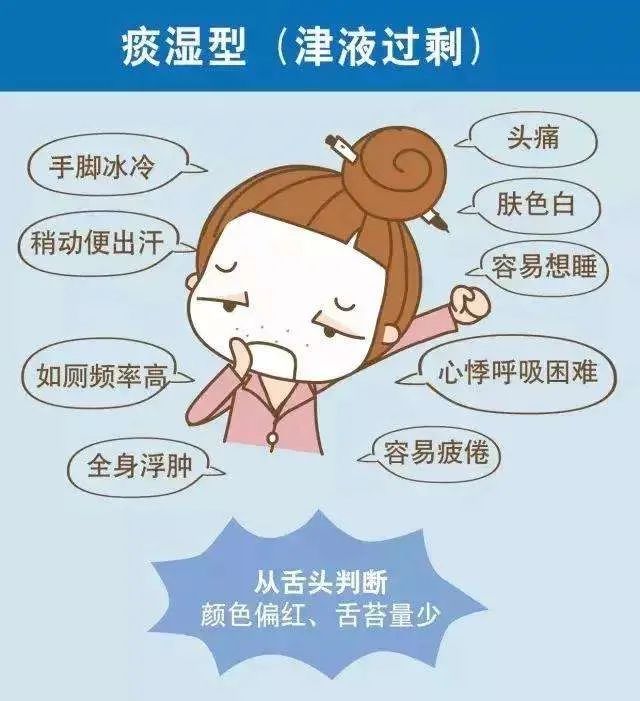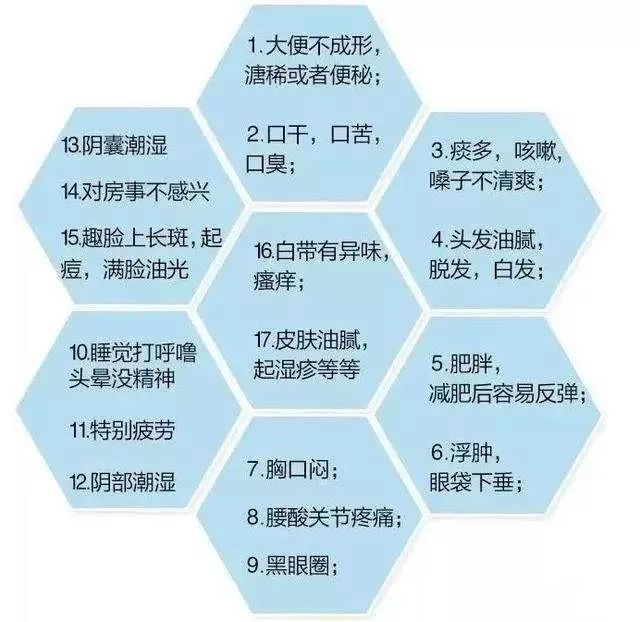Why do you often catch colds and find it hard to recover?
Why do you sweat easily and feel tired all day?
Why do respiratory diseases seem to follow you everywhere?
……
You may have noticed that you feel particularly fatigued and weak in the mornings, feel nauseous while brushing your teeth, have a dry and bitter mouth, and upon looking in the mirror, you see a haggard appearance with dull skin…
If you stick out your tongue, you will likely find that: the edges of your tongue have tooth marks resembling serrated edges, the tongue coating is yellow and greasy, and a white coating covers the entire tongue, with possible cracks in the middle…
If you go to the bathroom, you may find that your stools are loose and unformed, requiring a lot of toilet paper to clean up, and sometimes you may even experience constipation…
All of this is due to the influence of phlegm-dampness!

What is Phlegm-Dampness?
Phlegm-dampness is a term in Traditional Chinese Medicine (TCM) that refers to a type of constitution characterized by a dysfunction in the spleen’s ability to transform and transport fluids, leading to pathological products. Due to its viscous nature, once phlegm-dampness is produced, it becomes a new pathogenic factor that can cause further diseases.
Here, phlegm does not refer to the common understanding of phlegm, but rather to the abnormal accumulation of body fluids, which is a pathological product. Phlegm-dampness can be categorized into internal dampness and external dampness. External dampness refers to humidity in the air or environment, such as getting caught in the rain or exposure to damp conditions, which can invade the body and cause illness. Internal dampness refers to dysfunction in the digestive system, leading to uncontrolled fluid movement within the body, resulting in the accumulation of fluids, either due to excessive intake of moist foods or beverages, or due to the consumption of cold drinks, which can abruptly halt the flow of body fluids, thus forming internal dampness, known as phlegm-dampness.

Symptoms of Phlegm-Dampness Constitution
Body Shape and Complexion
Firstly, there will be changes in body shape, with signs of edema and a feeling of being puffy. The complexion may appear dark yellow, and there is often a state of fatigue.
Tongue
The tongue may become enlarged, with a slippery and greasy coating, and often shows imprints from the teeth. It is important to pay attention to this.
Mouth, Hands, and Feet
The mouth may feel sticky, lips may appear pale, and there is rarely a sensation of thirst, leading to a lack of desire to drink water. Sweating easily occurs, and after sweating, the skin feels cool. There may be a heavy sensation in the head and body, joint pain, and numbness of the skin.
Bowel Movements
There may be frequent, unformed stools, especially urgent bowel movements in the morning, with multiple trips to the bathroom at night, and the urine may be abundant and clear like water.
Mood
There may be frequent emotional fluctuations, irritability, forgetfulness, and a tendency to be lazy and sleep excessively. These various phenomena can lead to health issues, and it is important to check for these symptoms in a timely manner.
How to Regulate Phlegm-Dampness Constitution
First: Adjusting Environment and Lifestyle
① It is advisable not to stay in damp environments for long periods. During rainy seasons, one should be cautious to avoid the invasion of dampness. Regular checks of blood sugar, blood lipids, and blood pressure are also recommended.
② Those who tend to sleep excessively should gradually reduce their sleep time and engage in more outdoor activities to promote yang energy and stimulate the flow of qi, thereby activating bodily functions.
③ Pay attention to warmth. “Dampness moves with warmth and congeals with cold.” Cold weather is not conducive to the transformation of dampness within the body and can harm the spleen and stomach, so one should avoid exposure to cold.

Second: Physical Exercise
It is essential to maintain a long-term exercise routine. Aerobic exercises are particularly suitable for those with phlegm-dampness constitution, such as walking, jogging, hiking, cycling, swimming, and practicing Tai Chi.

Third: Mental Adjustment
Phlegm-dampness can easily lead to mental fatigue. It is important to participate in various activities, listen to light music, and engage in physical activity to nourish the spirit and strengthen the spleen. Additionally, one should avoid feelings of depression and anger to prevent liver qi stagnation and the internal generation of phlegm-dampness.
Fourth: Dietary Regulation
① The diet should be light, avoiding greasy, rich, cold, and moist foods.
② Alcohol should also be consumed in moderation, and one should avoid overeating.


